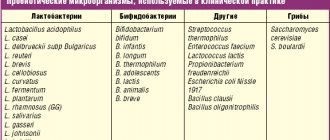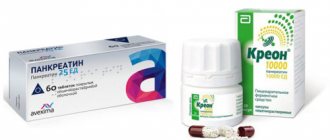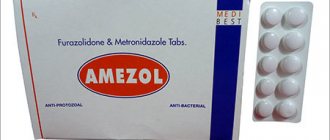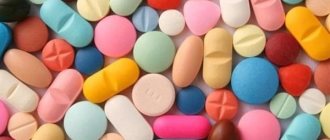Intestinal inflammation is a serious and dangerous condition that can be caused by several factors. When treating a disorder, the exact cause of the disorder must be established, since it is important to carry out not only anti-inflammatory therapy, but also to eliminate the main source of the disease. To diagnose an inflammatory process in any part of the intestine, various examinations can be prescribed, including ultrasound and general tests. After confirming the presence of the source of the disease, one of the effective drugs is selected to suppress the inflammatory process.
Anti-inflammatory drugs for the intestines
Causes of intestinal inflammation
The following factors can provoke the disease:
- infection by parasites, the violation is especially pronounced in the presence of a mixed type of helminthiasis;
- infectious lesion, which can also be caused by Trichomonas;
- autoimmune diseases, during which the body mistakes its own cells for foreign ones and begins to destroy them;
- genetic predisposition, most often manifested against the background of a lack of certain enzymes for digestion;
- errors in nutrition, especially with a passion for fatty, spicy and poorly fried foods;
- disturbances in the blood supply to the intestines, which can be caused by oncological processes and diseases of the cardiovascular system;
- disruption of intestinal microflora due to medications or other provoking factors;
- development of enteritis, manifests itself only in one area or throughout the entire section of the small intestine;
- the appearance of duodenitis, an inflammatory process in the duodenum and small part of the digestive tract;
- mesadenitis, an inflammatory process affecting the intestinal lymphatic system;
- colitis associated with the formation of a focus of inflammation in the colon.
Intestinal inflammation from the inside
Attention! All described conditions can occur in chronic and acute forms, especially when affecting the colon. In some cases, the acute stage can last for 4 weeks, after which it will be completely cured or become chronic.
Asacol against the inflammatory process in the intestines
The drug is available in several pharmacological forms; its choice depends on the location of the inflammatory process and its extent.
| Type of drug | Image | Exacerbation | Chronic form | A course of treatment |
| Pills | 0.4-0.8 g 3 times | 0.4-0.5 g 3 times | 8-12 weeks | |
| Suppositories | 500 mg 3 times | 500 mg 2-3 times | Individually | |
| Rectal suspension | 60 g once before bedtime | 30-60 g once before bedtime | From 8 weeks to several years |
The tablet form is most often used in situations where the inflammatory process is extensive and affects almost the entire intestine or all its parts. For smaller foci of inflammation, it is recommended to use Asacol in the form of rectal suppositories or rectal suspension.
The tablets are taken strictly after meals and should not be chewed. For better effects, it is recommended to drink them with plenty of water, at least 150-200 ml. In complicated cases, patients can increase the dose of tablets to 4 g per day, then it is important to divide the daily amount of the active substance into four doses. Before administering a suspension or rectal suppositories, if the patient has not had bowel movements before, it is recommended to do a microenema.
The drug Asacol in the form of rectal suppositories
Attention! Asacol is one of those drugs that, with proper dosage, can also be used for inflammatory processes in children. To do this, you should take into account the child’s age, diagnosis and weight. Use strictly under the supervision of a pediatrician.
Salofalk against intestinal inflammation
The main active ingredients of the drug are mesalazine and an anti-inflammatory complex. Refers to combination drugs that can not only relieve an acute condition, but also support the mucous membrane to prevent recurrence of the disease. Salofalk is also produced in several pharmacological forms, which are prescribed taking into account the current condition of the patient. Most often, tablets or granules are prescribed.
The drug Salofalk in the form of granules
Tablets must be eaten before meals, granules are taken at any time of the day. The dosage is also selected individually. The classic amount of Salofalk is 1.5-3 g in three doses. In case of severe or complicated intestinal inflammation, the dosage can be increased to 8 g of the active substance, also divided into three doses. The duration of therapy is determined by the attending physician and can last for several months.
Attention! Salofalk is well tolerated. But when taking this drug in any form simultaneously with corticosteroids, the negative effect of the hormonal component may be enhanced.
Video: Salofalk different dosage forms
Trichopolum for the treatment of inflammatory processes in the intestines
Refers to antiprotozoal drugs with high antibacterial activity. To prescribe this antibiotic, it is important to identify the exact cause of the spread of inflammation, since it is active only when exposed to anaerobic bacteria and Helicobacter bacteria.
The drug Trichopolum belongs to antiprotozoal drugs with high antibacterial activity
For the first type of disorder, it is recommended to prescribe 0.5 g of the anti-inflammatory component of the drug no more than four times a day. The duration of therapy in this case is 7 days. If signs of inflammation due to Helicobacter bacteria appear, it is recommended to take Trichopolum at a dose of 500 mg twice a day, also for seven days. You can take the medicine during or after meals; you must wash it down with water.
Attention! Trichopolum should be taken with great caution by patients suffering from high blood pressure and undergoing therapy against arterial hypertension. The antibacterial agent may enhance the effects of cardiac medications, which requires careful prescribing of both types of medications and a reduction in their dose.
Synbiotics - what are they and how are they useful?
The most common intestinal disease is dysbiosis. Many factors can provoke microflora disturbances: unbalanced nutrition, taking antibiotics, stress, poisoning, bacterial infection and many others. It is important to start treatment in a timely manner, otherwise serious complications may occur.
Synbiotics are recognized as the most effective medicine that promotes the rapid restoration of intestinal microflora.
The preparations are characterized by a high content of beneficial microorganisms. This is an innovative group of biological products with a perfectly balanced bacterial composition.
Benefits of synbiotics
According to the definition of Russian GOST, a synbiotic is a functional active food additive consisting of both prebiotics and probiotics. A balanced combination of beneficial microorganisms has a mutually reinforcing effect on metabolic processes and the functionality of all organs.
About 65% of immune cells are located in the mucous membranes. A decrease in their composition creates favorable conditions both for the growth of pathogenic bacteria and for the further development of various diseases. Synbiotics actively restore the disturbed balance, thereby increasing immunity.
This contributes to:
- removal of breakdown and metabolic products, toxins;
- improving digestive processes;
- neutralizing the effects of antibiotics;
- taking a synbiotic not only strengthens the entire body, but also solves numerous problems associated with the condition of hair, nails, skin, etc.
We recommend reading: what is the difference between prebiotics and probiotics.
Indications for use
- High blood pressure;
- Immunodeficiency;
- Impaired metabolism;
- Increased cholesterol levels;
- Dysbacteriosis – vaginal, viral;
- Viral, infectious diseases;
- Liver diseases;
- Stressful intestines;
- Diseases of the gastrointestinal tract;
- Hangover syndrome;
- Tuberculosis;
- Flatulence;
- Colic, intestinal spasms;
- Allergy;
- Overweight;
- HIV;
- Diarrhea, constipation;
- Poisoning;
- In case of acute vitamin deficiency;
- Staphylococcal infection;
- Helminthiasis;
- Chronic fatigue syndrome;
- Salmonellosis;
- Acclimatization;
- Oncological diseases;
- With increased physical or mental stress;
- After chemotherapy or a course of treatment with non-steroidal, antimicrobial drugs;
- To improve the condition of hair and skin.
Why is it so important to use synbiotics for dysbiosis?
When probiotics enter the gastrointestinal tract, they begin to normalize the microflora while simultaneously suppressing pathogenic bacteria. However, the beneficial bacteria contained in probiotics begin to die quickly. Microorganisms begin to actively reproduce only when prebiotics are taken.
The synbiotic contains two nutritional supplements at the same time. When it enters the gastrointestinal tract, it not only normalizes the qualitative composition of the microflora, but also changes the pH of the environment to the acidic side. As a result, the activity of beneficial bacteria increases.
Nutritional supplements have proven themselves well. They do not cause side effects and are indicated in treatment for people of various age groups. Nutritional supplements are recommended for pregnant women to take after a hormonal shift to normalize the intestinal microflora.
The list of food additives increases every year.
List of popular drugs
1. Maxilak Consists of nine probiotics and prebiotics. The biological product is recommended for various disorders of the gastrointestinal tract. It has a strengthening effect on immune, motor function, and respiratory organs.
2. Lactiale The supplement contains 2 types of bifidobacteria and 4 lactobacilli present in normal microflora. They actively destroy harmful microcultures, eliminating the causes of their formation, and support the nervous and immune systems. Strains of microorganisms begin to colonize the intestines after 2-3 hours of taking the supplement.
3. Bifilis Differs in the content of 108 colony-forming units of bifidobacteria. The drug is effective for eliminating the symptoms of dysbiosis of any stage, for inflammation of the gastrointestinal tract, and for the prevention of infectious processes.
4. Bilactin Contains Enterococcus strains present in the normal intestinal microflora. The drug actively destroys pathogenic microorganisms - produces the L-form of lactic acid.
An effective probiotic food supplement normalizes metabolic processes.
The drug prevents the development of pathogenic organisms and is indicated for liver diseases, dysbacteriosis, impaired digestive processes, and as antibacterial therapy.
Also synbiotics are:
- Filtrum;
- Bifidoback;
- Normospectrum;
- Bactistatin;
- Extralact;
- Normoflorin-L/B;
- Biovestin-lacto;
- Lactofiltrum;
- Polyphytohol;
- Maltidophilus.
Tsiprolet to suppress inflammation in the intestinal tract
The drug belongs to the antibacterial agents from the group of fluoroquinolones. It has a wide range of effects and excellent performance. The dosage of Tsiprolet is 500 mg of the active ingredient twice a day. It is advisable to take the medication an hour after meals. The duration of therapy is 7 days, while it is recommended to take the medication for another two days as a prophylaxis.
Tsiprolet has a wide range of effects and excellent performance
The drug is one of the most effective and fast-acting. This feature is due to the presence of ciprofloxacin in the composition. But this substance can cause instant allergic reactions, including anaphylactic ones. It is advisable to take the first dose of the medication under the supervision of the attending physician, regardless of the form in which it was prescribed. A safer form is Tsiprolet in tablets, which are usually prescribed for intestinal inflammation. In some cases, injections are required; they are given only in a medical facility.
Attention! Tsiprolet should be prescribed with great caution to elderly patients. In addition, mandatory medical consultation is necessary for patients suffering from epilepsy and similar diseases of the central nervous system. When using Tsiprolet, you should strictly follow the drinking regime, since there is a high probability of crystalluria.
List of anti-inflammatory drugs
The advisability of prescribing one or another group directly depends on the severity of the symptoms of the disease.
All drugs for internal use are prescribed only by a doctor and are dispensed from pharmacies with a prescription.
Oral administration
Aminosalicylic acid and its analogues. Of this group, mesalazine-based drugs are most often prescribed. They are produced in the form of tablets or granules for internal use. They are endowed with special shells that allow the drug to dissolve throughout the colon without being destroyed in the acidic environment of the stomach. They have an anti-inflammatory effect by blocking the production of prostaglandins, which increase the sensitivity of certain receptors to pain.
The maximum concentration of the active substance in the blood is detected 5 hours after the first use. These drugs are used for exacerbation and for the prevention of ulcerative colitis and Crohn's disease.
Trade names of mesalazine:
- Mesacol;
- Salofalk;
- Mezavant;
- Pentasa;
- Asakol.
Sulfasalazine is also widely used.
It has anti-inflammatory and antimicrobial bacteriostatic effects. Reaches maximum concentration 3-12 hours after application. It has found application in ulcerative colitis (treatment of exacerbations and maintenance during remission), mild and moderate Crohn's disease. Produced under the same name by different manufacturers. There are different coatings for these tablets: film and enteric. The drug coated with the second type is considered better.
It is more toxic to the body compared to mesalazine. A prerequisite for use is the combination with folic acid (vitamin B9). The fact is that the drug inhibits its absorption in the small intestine, so you need to additionally take drugs with a high content of vitamin B9.
Be sure to read: Jejunitis (inflammation of the jejunum): symptoms, treatment and prognosis for life
Corticosteroids. The second group, which is also used for inflammatory bowel diseases, when previous drugs did not relieve symptoms or Crohn's disease has systemic manifestations. Prednisolone tablets are usually used. It has an antiallergic and anti-inflammatory effect, reduces capillary permeability, and reduces the formation of scar tissue. It acts on all stages of inflammation and increases the resistance of cell membranes to the destructive effects of various factors.
The maximum concentration is achieved an hour and a half after internal use. Used for ulcerative colitis, local enteritis, Crohn's disease. Produced under the same name.
Rectal application
There are drugs that are injected directly into the rectum. They have less systemic effects on the body and are easier to tolerate. Rectal forms are divided into the same pharmacotherapeutic groups as oral ones.
Preparations based on mesalazine:
- Suppositories (Kansalazin, Pentasa, Salofalk). Used for exacerbation of ulcerative colitis of the lower rectum or during remission.
- Rectal suspension (Pentasa, Salofalk). Used for inflammation of the sigmoid colon and left-sided ulcerative colitis. It is administered using a ready-made enema with a solution once a day at night, preferably after bowel movement naturally.
- Foam for rectal use (Salofalk). It is used for the same symptoms as the candles of the same name. Usually administered into the rectum at night, the daily dose is 2 presses on the bottle pump. If a person cannot hold this amount of foam inside, the dose is divided into 2 times: at night and at night/early in the morning. The uniqueness of the foam lies in its adhesive properties; it stays on the mucous membranes for a very long time.
Other drugs for rectal use:
- Proctosan. Treats inflammatory processes in the rectal area. It contains a local anesthetic component, which can temporarily bring relief by suppressing pain symptoms. Available in the form of ointments and suppositories.
Be sure to read:
Intestinal colitis: symptoms and treatment in adults
- Methyluracil. Used for erosive and ulcerative colitis and inflammation in the sigmoid colon. Accelerates epithelization processes, which allows wounds to heal faster.
- Ultraproct. Contains a glucocorticosteroid and local anesthetic, used for proctitis. It has anti-inflammatory, antipruritic and analgesic effects.
Metronidazole against inflammatory processes in the digestive system
A traditional drug for the treatment of most types of infectious diseases, it has absolutely no effect on viral sources of pathology. Available in the form of tablets for oral use. The dosage of Metronidazole is selected taking into account the intensity of symptoms and the source of inflammation. It can be 250-500 mg of the active ingredient up to three times a day. It is recommended to take the antibacterial agent an hour after eating.
The drug Metronidazole
If you are intolerant to the drug, it can increase unpleasant symptoms, which will manifest itself in severe colic, abdominal pain, and severe dryness in the oral cavity. If such symptoms intensify, you should immediately inform your doctor to prevent complications of the patient’s condition. If it is necessary to take Metronidazole and antacids containing aluminum, it should be taken into account that the effect of the second drug will not be as pronounced. But it is not recommended to increase the dose of the antacid.
Attention! Metronidazole is poorly tolerated in combination therapy with amoxicillin. Such a combination should be used only if there are real indications and only from an adult age.
Review of drugs for dysbiosis
When taking harmful antibiotics, it is better to take medications from the following groups for dysbiosis: enterosorbents, means for restoring microflora. Medicines help improve digestion and restore gastrointestinal microflora.
For prevention, it is advisable to start using medications simultaneously with taking antibiotics.
Information about medications is presented for informational purposes. The treatment regimen is prescribed by the doctor.
Prebiotics, probiotics
The drugs restore the beneficial microflora of the gastrointestinal tract. Probiotics are a dry concentrate of beneficial bacteria that restore acidity and increase the absorption of microelements when taking antibiotics and dysbacteriosis.
| Name of medicine | Peculiarities |
| Linex | The drug contains live lactic acid bacteria. Bifidobacteria are balanced and supplied in the required ratio (normally, lactic acid streptococcus and lactobacilli are found in the small intestine, bifidobacteria in the large intestine). The only contraindication to use is individual sensitivity. The medication is safe for children and can be used during pregnancy and lactation. |
| Acipol | The product contains acidophilic lactobacilli and kefir grain polysaccharide. Normalizes the microflora of the gastrointestinal tract and has a corrective effect. |
| Enterol | The active substance is fungi of the Saccharomyces class. Neutralization of pathogenic microflora occurs during dysbacteriosis. Fungi do not accumulate; after 2-5 days the medicine is excreted from the body along with feces. |
| Bifidumbacterin | The composition of the medicine includes a dry microbial mass of living bacteria on activated carbon. The drug has detoxifying properties. |
The drugs are produced in the form of dietary supplements: Normoflorin, Vitaflor.
Prebiotics provide “food” for the development of intestinal bacteria. The composition of the medications includes inulin, lactose, amino acids, and dietary fiber. There is a stimulation of an increase in the number of beneficial microorganisms when taking antibiotics.
| Name of medicine | Peculiarities |
| Hilak forte | Restores acidity, preserves the functions of the mucous membranes of the gastrointestinal tract. Normalization of microflora composition. |
| Lactofiltrum | Normalization of the metabolism of fats, proteins, carbohydrates. Neutralization of symptoms of dysbiosis. Accelerates the absorption of microelements and vitamins. |
| Lactusan | A drug based on lactulose, a substance that normalizes the growth of lactobacilli. Restores the necessary balance of beneficial intestinal microorganisms. |
The drugs are taken one and a half hours after taking antibiotics to prevent dysbiosis.
Enterosorbents
Medicines for dysbiosis after antibiotics promote the absorption of toxic substances and their removal from the body.
| Name of medicine | Peculiarities |
| Smecta | Sorbent of natural origin. Restores the mucous barrier, improves the quality and quantity of mucus, removes toxins. |
| Polysorb | It has detoxification, sorption, antioxidant properties. The active ingredient is silicon dioxide. |
| Enterosgel | Binding and removal of toxic substances of any nature: bacteria and their metabolic products, poisons, salts of heavy metals. Not absorbed into the gastrointestinal tract and systemic circulation. It is excreted by the body after 12 hours. |
| Activated carbon | Removal and binding of toxic substances from the gastrointestinal tract. As a result, gas formation and flatulence are reduced. |
Sorbents interfere with absorption and reduce the effectiveness of antibiotics; it is important to maintain an interval of 2-3 hours between doses.
Vitamins
With dysbacteriosis, vitamins and minerals are washed out of the body. To replenish them, take multivitamin complexes even after completing the course of antibiotic therapy. Taking medications containing vitamins A, B, C, E, tocopherol, and beta-carotene will be beneficial.
List of vitamins that normalize microflora: Alphabet with prebiotics, Multi-tabs Immuno Plus.
Folk remedies
It will not be possible to normalize the microflora and remove toxic substances from the body after taking antibiotics only with the use of folk remedies.
Folk remedies are natural in composition, they can be used in the absence of individual intolerance.
Medicines to strengthen the immune system can be taken together with antibiotics for dysbacteriosis:
- rosehip decoction, berry jelly, fruit drinks, dried fruit compotes;
- Take 1 tbsp 3 times a day. honey dissolved in 1 tbsp. warm water. Consume before lunch.
Means for normalizing microflora in case of dysbacteriosis, which can be prepared at home:
- Milk serum. Place the jar of kefir in hot water. The product will separate into curds and whey. You only need to drink whey.
- Curdled milk to restore microflora. Boil 1 liter of milk. After the liquid has cooled slightly, crumble dried rye bread into the milk and wait a day. After this time, bread crumbs, previously rubbed with garlic, are added to the solution.
- Eat fresh strawberries (200 g) daily for a week.
Sulfasalazine against inflammatory processes in the intestines
The drug is available in the form of tablets coated with a thin enteric coating. Used as a fast-acting anti-inflammatory and antimicrobial agent. Sulfasalazine should not be used for any diseases of the circulatory system, since the effect of this antibiotic leads to their exacerbation.
The drug Sulfasalazine is used as a fast-acting anti-inflammatory and antimicrobial agent
When treating an inflammatory process in the intestines, you should strictly adhere to the prescribed regimen; adjustments to the classical treatment can only be made by the attending physician if there are real indications. On the first day, the patient should take 500 mg of the active ingredient 4 times. From the second day, the dosage is doubled and is 1 g, also four times a day. From the third day until the acute period is over, the dose of Sulfasalazine is 1.5-2 g of the active ingredient four times a day. Maintenance therapy is 0.5 g of the active substance up to three times a day, in some cases up to four. The exact duration of therapy should be selected individually for each patient.
List of names and descriptions of Bio-In products
Immune care
A symbiotic created to strengthen the immune system, eliminate allergic reactions (increased sensitivity of cells to allergens) and restore the protective biological barrier in the intestines. Contains bifidobacteria and lactobacilli, vitamin B5 and fructooligosaccharides.
Nutrition care
Consists of 11 strains of bacteria that effectively affect the entire gastrointestinal tract. The complex promotes the production of vitamins B and K, improves digestion and absorption of nutrients from food, prevents poisoning and the development of infectious diseases. Helps maintain the health of the oral cavity and teeth in particular and reduce the risk of diabetes.
Women Care
This is a complex designed specifically for women: it helps to avoid the development of vaginal dysbiosis, fight infectious diseases of the genitourinary system (cystitis, thrush, etc.) and maintain the natural pH level. Normalizes intestinal microflora, strengthens the immune system, activates metabolism and helps normalize weight.
The drugs are available in the form of sachets, the contents of which must be dissolved in warm water and drunk 30 minutes before the main meal. It is recommended to take symbiotics at least 1-2 times a day. The duration of treatment is determined individually.
Vision products are unpretentious to storage conditions, the main thing is that you choose a dry place with an ambient temperature of no higher than 25 degrees.
Using the products separately leads to positive results, but much greater effectiveness can be achieved only with the comprehensive use of all drugs according to one of the programs.
You can purchase any product or an entire program at a discount of up to 40%. Call for details!
Movalis to suppress inflammation in the intestinal tract
The drug belongs to the class of non-steroidal anti-inflammatory drugs. Available in the form of injections for intramuscular administration. Movalis can only be used in adults. The active substance should be administered only once a day, and the injection should be as deep as possible. The dosage of the active substance in the acute stage is 15 mg; after the acute inflammatory process has resolved, it is advisable to reduce it to 7.5 mg.
Solution for intramuscular administration Movalis
Injections are recommended to be used only in the first few days of treatment, as they negatively affect the functioning of the kidneys, liver, gastrointestinal tract and heart. After eliminating severe inflammation, the patient can be transferred to the tablet form of Movalis. Tablets should also be taken once a day in the amount of 7.5 mg of the active ingredient. The duration of treatment is selected individually for each patient.
Attention! When prescribing Movalis in any form, especially when using injections, since they act quickly and immediately penetrate the bloodstream, it is advisable to exclude pathologies of the upper gastrointestinal tract. If any, treatment is usually carried out in the minimum permissible doses of the drug.
Alpha Normix to suppress the inflammatory process in the intestines
The main active ingredient of the drug is rifaximin, which is a semi-synthetic derivative. It has noticeable anti-inflammatory and antimicrobial effects. When using Alpha Normix, the active substance may slightly turn the urine red. To exclude possible bleeding in this case, you should consult with your doctor and undergo additional examination.
Alpha Normix has a noticeable anti-inflammatory and antimicrobial effect
The dosage of the active substance for intestinal inflammation is 200-400 mg 2-3 times a day. In acute stages, the maximum dose of Alpha Normix is 0.4 g three times a day. The drug is also available in the form of a suspension. When prescribed, the patient should take 10-20 ml of the drug no more than three times a day. For severe damage, 20 ml of solution three times a day. Duration of treatment as directed by the attending physician.
Attention! Simultaneously with the use of anti-inflammatory and antibacterial drugs, the patient must undergo combination therapy with corticosteroids, immunomodulators and be sure to adhere to proper nutrition. If you use only the medications described, treatment may not be effective enough.
Video - Irritable bowel syndrome: symptoms and treatment
Video - All detailed information about intestinal inflammation
Regardless of the cause of the disorder and the intensity of symptoms in inflammatory processes, one of the described drugs or its analogue is mandatory. In the absence of therapy, the pathology quickly progresses and can spread to other parts of the digestive system. At the same time, the patient suffers from severe pain and experiences significant problems with digestion and bowel movements. Only competent treatment and the use of appropriate medications can guarantee a quick recovery with minimal possibility of side effects. The child often complains of abdominal pain, read on our website.
Is it possible to take symbiotics for prevention?
Complex probiotics are safe for adults and children. They rarely cause side effects. They have virtually no contraindications, with the exception of individual allergies and congenital lactase deficiency.
That is, symbiotics can be used independently, without a doctor’s prescription. They will improve your health and eliminate harmful substances. Will help in the fight against pathogenic pathogens.
Symbiotics are necessarily recommended to all patients undergoing treatment with antimicrobial, antimycotic, hormonal and anticancer drugs in order to prevent dysbiosis. Cancer patients undergoing chemotherapy and radiotherapy also need these drugs.
In gynecological practice, symbiotics are used to sanitize the birth canal of pregnant women and prevent intrauterine infections of the fetus. Also prescribed to prevent recurrent colpitis of a nonspecific nature.
In pediatrics, preparations with beneficial microorganisms are recommended to increase local immunity in the fight against frequent colds and ENT pathologies. In newborns and infants, symbiotics are used to prevent flatulence and intestinal colic.
In continuation of the topic, be sure to read:
- What medications should I use for increased gas formation?
- Carminative drugs for adults and children: list of medicines
- Irritable bowel syndrome: symptoms and treatments
- Rectal fissure: causes, symptoms and treatment of pathology
- Representatives of normal (useful) intestinal microflora: maintenance standards
- Details about the coprogram: preparation, conduct and interpretation of the analysis
- More about hemorrhoids: causes, symptoms and treatment methods
- Treatment tables (diets) No. 1-15 according to Pevzner: food tables and diet
- What are synbiotics, their benefits and list of drugs
- Probiotics and prebiotics: definition and list of drugs
Be sure to read:
How antibiotics act on the body, their pros and cons











